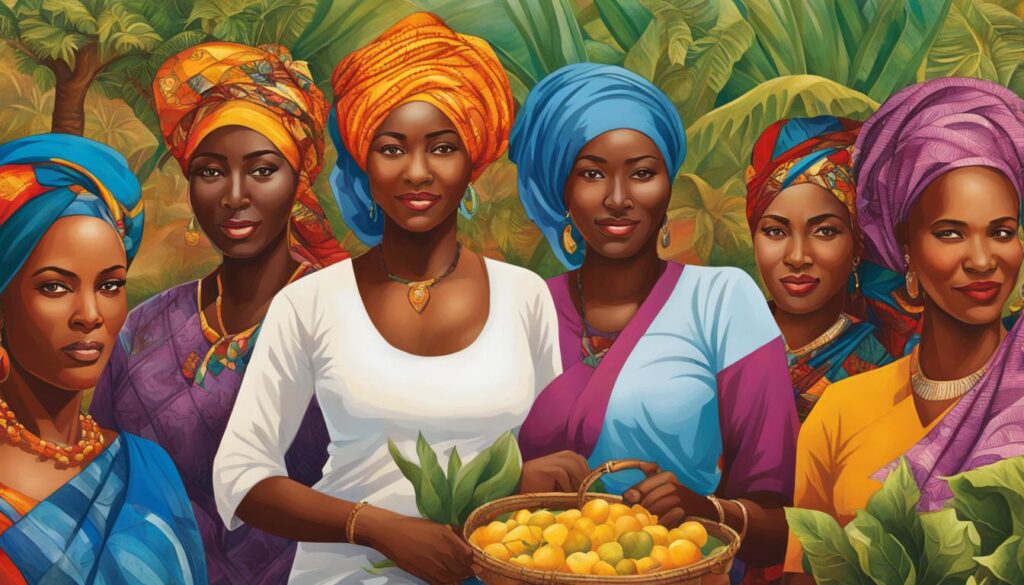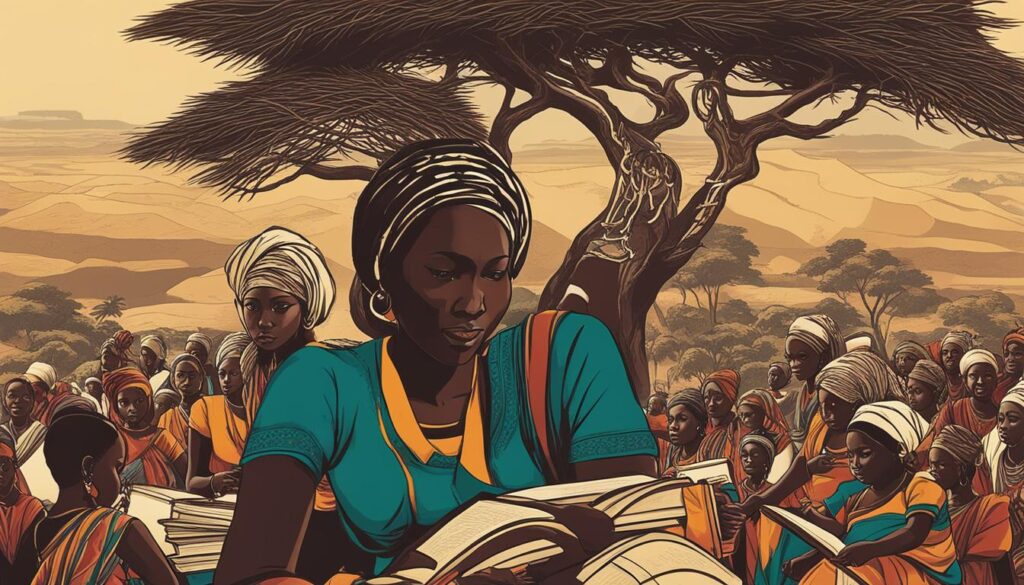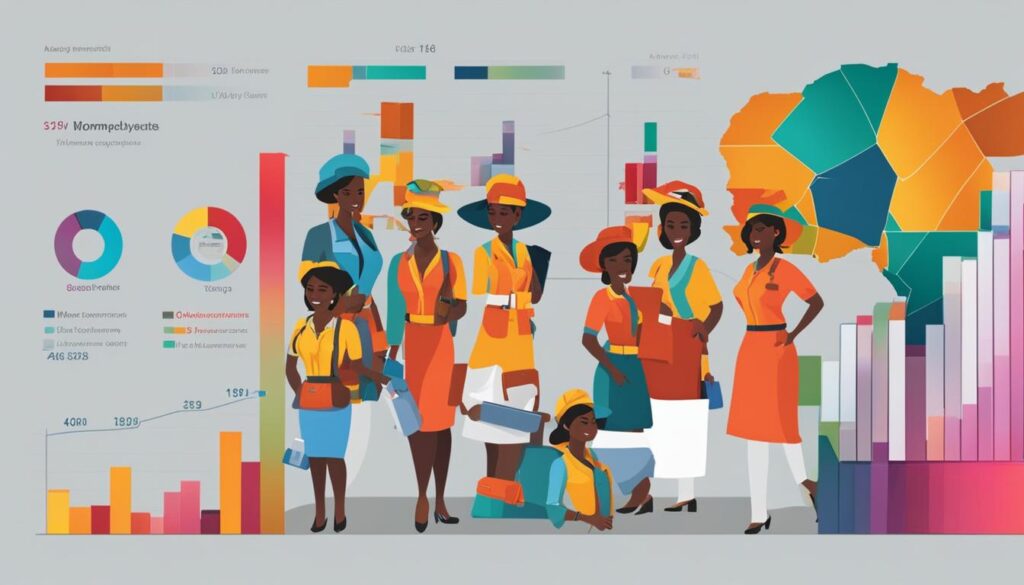As Africa continues to evolve and present new economic opportunities, the persistent issue of gender inequality hampers the continent’s progress. Research from the McKinsey Global Institute reveals that closing the gender gap in Africa could lead to a 10% boost in the continent’s economies by 2025, equivalent to a substantial increase in GDP. However, gender equality has stagnated, and at the current pace, it would take over 140 years for Africa to achieve parity. The gender parity score for Africa is a concerning 0.58, indicating high levels of inequality across various indicators.
African countries display varied progress in terms of gender equality, with South Africa leading the way with a score of 0.76 and Mauritania, Mali, and Niger trailing behind with scores of 0.46 and 0.45 respectively. To fully comprehend the state of women’s employment in Africa, let’s delve into the statistics and explore the trends shaping the labor market for African women.
Key Takeaways:
- Africa’s gender parity score is 0.58, reflecting high levels of gender inequality across the continent.
- Closing the gender gap in Africa could boost the continent’s economies by 10% of their collective GDP by 2025.
- South Africa leads the way in terms of gender equality, with a score of 0.76.
- Mauritania, Mali, and Niger have the lowest gender parity scores in Africa.
- It would take over 140 years for Africa to achieve gender parity at the current rate.
Economic Potential Hindered by Gender Disparity
Gender inequality in Africa is a significant barrier that hinders the continent’s economic growth potential. Despite women accounting for more than 50% of the population, they only generated 33% of the collective GDP in 2018. The lack of gender diversity poses a limitation on Africa’s social and economic progress.
Closing the gender gap and achieving gender parity is essential for enhancing the GDP of African nations. According to research from the McKinsey Global Institute, achieving gender parity in Africa by 2025 could provide a substantial boost equivalent to 10% of the continent’s GDP. This emphasizes the significant economic impact that gender equality can have on Africa’s development.
However, progress towards gender equality has been slow, and there are significant variations in progress across different African nations. It is crucial to address the underlying causes and barriers that contribute to gender inequality in African employment. By implementing targeted strategies and policies, African nations can work towards creating more inclusive and gender-equal economies.
Women’s Participation in African Labor Markets
When examining women’s participation in African labor markets, it becomes apparent that the informal sector dominates their employment. Many African women find themselves engaged in low-paid and subsistence jobs within this sector. Despite some advancements in women’s leadership roles, disparities persist. Women continue to face significant gaps in middle and senior management positions, hindering progress towards gender equality in these roles.

Informal Sectors Dominate Women’s Employment
The informal sector plays a dominant role in shaping women’s employment opportunities in Africa. African women often find themselves working in areas such as agriculture, domestic work, or street vending. However, these jobs tend to be unstable, offer low wages, and lack social protection. The informal sector presents significant challenges for women, limiting their access to stable and quality employment.
Advancements in Leadership Yet Disparities Persist
While there have been notable advancements in women’s leadership roles across Africa, gender disparities persist. Women continue to face significant barriers in accessing leadership positions, particularly in the formal economy. Limited representation of women in decision-making roles and traditional gender biases contribute to the slow progress in achieving gender equality in leadership positions.
Persistent Gaps in Middle and Senior Management Roles
Women in Africa face persistent gaps in middle and senior management roles, which further exacerbate gender disparities in the workplace. Factors such as unconscious bias, limited access to training and development programs, and the prevalence of cultural norms that hinder women’s advancement contribute to these gaps. Efforts are needed to address these barriers and create more inclusive environments that support the career progression of women in Africa.
Societal Gender Gaps in Africa
Society in Africa faces significant gender gaps in various areas. These gaps contribute to inequality and hinder progress towards a more inclusive and equitable society. In this section, we will explore three key aspects of gender gaps in Africa: education and digital access, political representation, and financial and material obstacles faced by women.
African Women’s Education and Digital Access
When it comes to education and digital access, African women continue to face disparities. Gender gaps in education persist, limiting women’s opportunities for personal and professional growth. The lack of access to quality education undermines their potential and hinders economic development.
In addition, African women encounter barriers in accessing and utilizing digital resources. Limited access to technology, internet connectivity, and digital literacy further exacerbate the gender digital divide. Closing these gaps is crucial for women to fully participate in the digital economy and benefit from its opportunities.

The Political Landscape and Representation of Women
Political representation is another area where gender gaps are evident in Africa. Women are significantly underrepresented in political leadership roles, including in parliaments and government cabinets. This underrepresentation perpetuates imbalances of power and decision-making, contributing to ongoing gender inequalities.
Increasing the representation of women in politics is essential for fostering gender equality and inclusive governance. It allows for a more diverse range of perspectives, leading to better policymaking and more comprehensive solutions to societal challenges.
Financial and Material Obstacles Faced by Women
Financial and material obstacles pose significant challenges for women in Africa. Limited access to financial services, credit, and land ownership creates barriers to economic empowerment. Women often face discriminatory practices and legal frameworks that impede their ability to fully participate in the economy.
Furthermore, women in Africa bear a disproportionate burden of unpaid care work, including household responsibilities and childcare. These responsibilities limit their time, energy, and opportunities for economic advancement. Addressing these obstacles is crucial for creating an enabling environment where women can thrive economically and contribute to sustainable development.
Keys to Unlocking Women’s Economic Participation
To unlock women’s economic participation in Africa, it is crucial to address the deep-rooted gender biases that exist in society. These biases create barriers and hinder the progress of women in various facets of life, including the workforce. Strategies must be implemented to challenge and overcome these biases, ensuring equal opportunities for women to thrive and succeed.
Strategies for Tackling Deep-rooted Gender Biases
Tackling deep-rooted gender biases requires a multi-faceted approach that involves both individuals and organizations. Here are some effective strategies to promote gender equality and empower women:
- Promoting education: By investing in girls’ education and providing equal educational opportunities, we can equip them with the knowledge and skills necessary to compete in the workforce.
- Addressing stereotypes: Challenging and dismantling harmful stereotypes and societal norms that perpetuate gender biases is essential. This can be done through campaigns, media representation, and education initiatives.
- Creating inclusive workplaces: Organizations have a vital role to play in creating inclusive work environments that value diversity and provide equal opportunities for career growth and advancement.
- Supporting women entrepreneurs: Establishing programs and policies that support women in entrepreneurship can help level the playing field and provide economic opportunities.
Importance of Educating and Developing Human Capital
Educating and developing human capital, especially among women, is a crucial aspect of promoting women’s economic participation in Africa. Here’s why:
- Economic growth: Education and skill development are essential for driving economic growth and development. By investing in the education of women, African countries can tap into a significant source of human capital and foster innovation and productivity.
- Breaking the cycle of poverty: Education empowers women to break free from the cycle of poverty, providing them with better employment opportunities and the ability to support themselves and their families.
- Enhancing decision-making: When women have access to education and skill development, they become better equipped to participate in decision-making processes, both at the individual and societal levels.
- Building resilient communities: Educated women are more likely to make informed decisions about their health, their children’s education, and their communities’ well-being. This ultimately leads to the creation of more resilient and sustainable communities.
By implementing effective strategies to tackle gender biases and prioritizing the education and development of human capital, African countries can empower women, promote their economic participation, and drive sustainable and inclusive growth.
| Benefits of Tackling Gender Biases and Investing in Human Capital | Opportunities for Women in Africa |
|---|---|
| Increased economic growth | Access to quality education |
| Reduced poverty rates | Career advancement and leadership roles |
| Improved decision-making | Entrepreneurship and business ownership |
| Stronger communities | Equal opportunities for economic empowerment |
Women Employment Stats for Africa
In this section, we will delve into the latest statistics and trends regarding women’s employment in Africa. These statistics shed light on crucial aspects such as labor force participation rates, employment rates, and the progress of women’s economic empowerment initiatives in the region. Understanding these figures is vital for promoting women’s economic empowerment and fostering gender equality in Africa, ultimately driving the continent’s overall development.
Let’s examine some key statistics:
“In 2020, the female labor force participation rate in Africa was 47.6%, indicating that about half of the eligible women were actively engaged in the workforce.”
While there has been progress in increasing women’s participation in the labor market, there are still significant disparities across African countries. Some nations have made substantial strides, while others continue to face challenges in achieving gender equality in employment.
Promoting women’s economic empowerment is not only a matter of social justice but also makes strong economic sense. Empowering women through increased employment opportunities can drive economic growth, enhance productivity, and contribute to poverty reduction. When women have access to decent jobs, they can invest in their families, communities, and the broader economy, fostering a positive cycle of development.
Now, let’s take a closer look at the employment rates and progress of women’s economic empowerment initiatives in specific African countries:
| Country | Female Employment Rate | Progress in Women’s Economic Empowerment |
|---|---|---|
| Ghana | 52% | Active initiatives promoting women’s access to finance and entrepreneurship |
| Kenya | 43% | Increasing emphasis on women’s education and skills development |
| Nigeria | 44% | Efforts to enhance women’s political participation and leadership |
These examples demonstrate the diverse strategies implemented by African countries to drive women’s economic empowerment and improve employment rates. While progress is being made, there is still much work to be done in order to achieve gender equality and create more inclusive and equitable workplaces across the continent.
Conclusion
Throughout this article, we have explored the key insights and trends surrounding women’s employment in Africa. It is evident that empowering women through employment is crucial for the continent’s development. Achieving gender equality in African workplaces is not only a matter of fairness, but it also holds significant economic potential.
By promoting women’s economic participation, Africa can unlock new opportunities for growth and innovation. Closing the gender gap in labor force participation, ensuring equal access to education and resources, and addressing deep-rooted gender biases are essential steps towards achieving this goal.
Creating a more inclusive and equitable workforce in Africa is not only a moral imperative but also a strategic move to drive sustainable economic growth. When women are empowered through employment, they can contribute their skills, talents, and perspectives, leading to enhanced productivity and innovation in the workplace.
As we move forward, it is crucial that governments, businesses, and civil society organizations work together to address gender disparities and create enabling environments for women’s economic empowerment. We must strive for gender equality in African workplaces, where women can thrive, progress, and lead.





